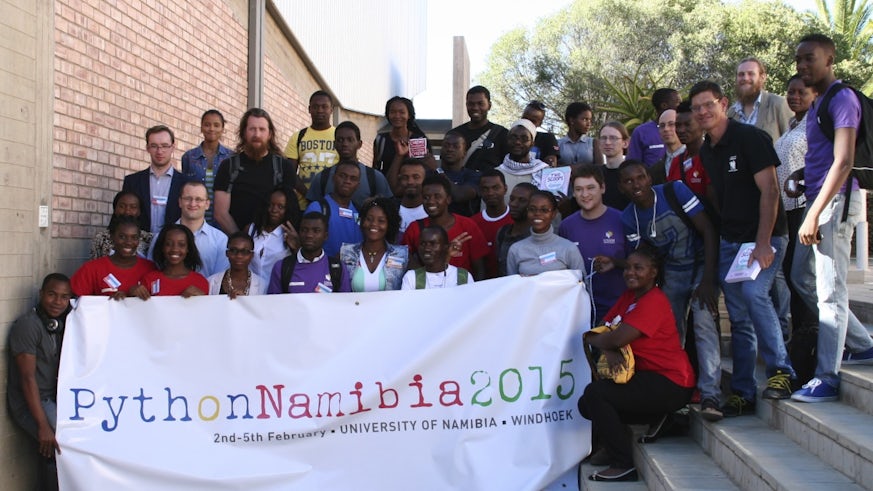High hopes for software event
18 January 2016

An international software gathering in Namibia, supported by Cardiff University, could help put Africa at the centre of a multi-billion pound industry, say organisers
The programming language Python is hugely popular around the world and is used by major web-based brands such as Google, Dropbox, Pinterest and Instagram.
It is also popular with academics in subject areas such as mathematics, computer science, medicine, astronomy and data analysis.
Python is a major part of the lucrative open source software industry but there is a global shortage of programmers, creating opportunities for those with the necessary skills.
It is hoped PyCon Namibia 2016 will help inspire a generation of Python programmers in Namibia to develop the software for their own and their country’s needs.
The event takes place at the University of Namibia (UNAM) in Windhoek from 25-29 January with support from Cardiff University’s Phoenix Project, which has teamed up with UNAM for a raft of activities involving education, health and science.
Cardiff University School of Mathematics lecturer Dr Vince Knight, one of the organisers, said: “There are some great programmers in Namibia who can help the budding software industry in all sorts of things, not just in Namibia but in Africa as a whole.
“Pinterest and Instagram are written in Python, it’s a very powerful language. The next Pinterest or Instagram could come out of Namibia - why not?
“A lot of scientific research and web development is also done in Python and it’s possible to create a company out of nothing using it.
“The students over there can learn skills that makes them competitive and that’s very, very valuable.”
The first Python conference in Namibia took place last year but 2016 is bigger, bringing together many professional software developers, scientists, academics and students for talks, workshops and collaboration.
The majority of delegates are Namibian but others are from countries including Brazil, the UK, Netherlands, Germany, Canada, Nigeria, Zimbabwe, Zambia and South Africa.
While Cardiff University and UNAM remain heavily involved in the event, PyCon Namibia 2016 is being run by PyNam, the Python Namibia Society, formed in the wake of last year’s event.
Jessica Upani, chair of PyNam, said: "We are hoping that PyCon Namibia 2016 will help us get to know each other and work together because I know of brilliant minds here at UNAM who will benefit greatly from guidance from someone more matured in programming. Hence I call upon the local developers to reach out and meet us half way.
“We (PyNam) feel that as much as we are working on developing our programming abilities at the university level, we would be failing if we don't look to uplift the young ones who are just as equally important to this journey if not more. Hence we have already started reaching out to them at schools to teach them one or two things that we have learned and give them career advice.
“I feel that we can achieve greatness as much as the rest of the world is, but it is up to us to build our team and build it well. It is up to us to build confidence in our programmers and I feel that the time is now."
The Phoenix Project, which supports the Welsh Government’s Wales for Africa programme, is a mutually beneficial collaboration between Cardiff University and UNAM.
Staff from Cardiff University’s three Colleges are directly involved, as are professional services staff.
It is one of Cardiff University’s flagship engagement projects, otherwise known as the Transforming Communities programme, which work with communities in Cardiff, Wales and beyond in areas including health, education and wellbeing.